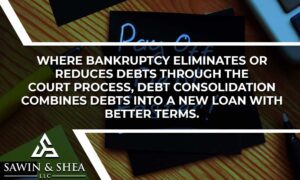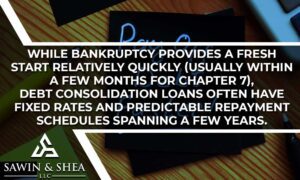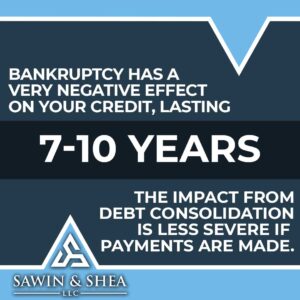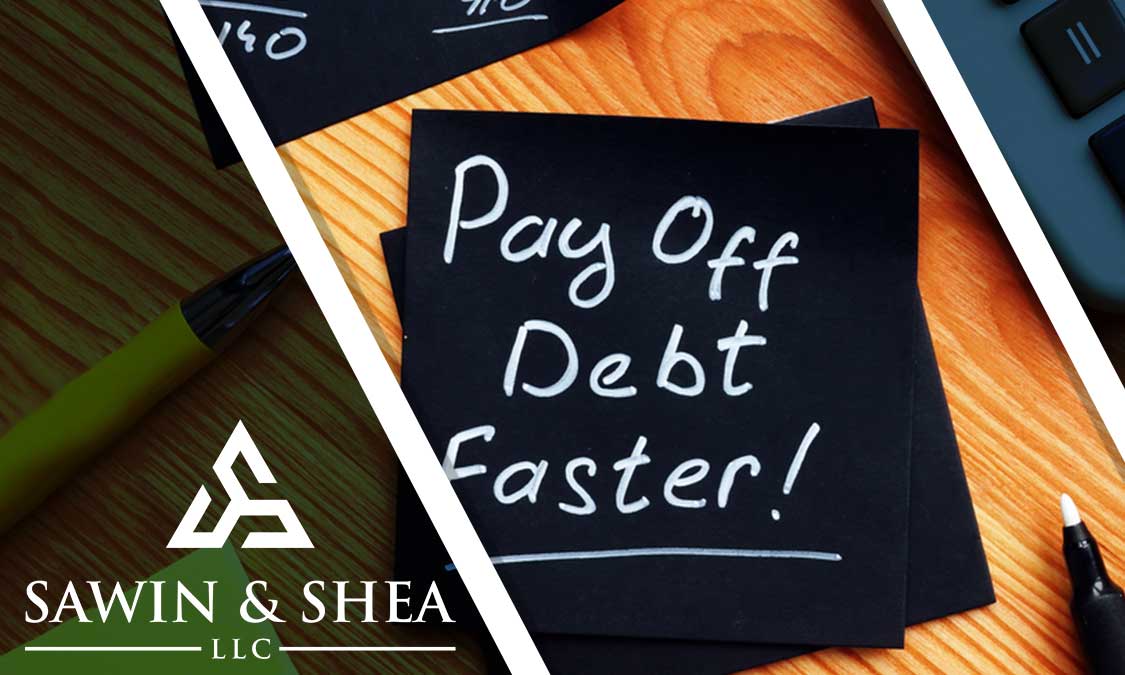
When you are overwhelmed by debt, you may start to wonder if declaring bankruptcy or pursuing debt consolidation is the better option. Both strategies aim to provide relief, but they work very differently. Understanding the key aspects of each can help you determine what is better, bankruptcy or debt consolidation, for your situation.
The Pros and Cons of Debt Consolidation vs Bankruptcy

With debt consolidation and bankruptcy, each path comes with its own set of advantages and drawbacks. Understanding the pros and cons of debt consolidation versus bankruptcy is crucial for making informed decisions about one’s financial future. Below are some of the key aspects of both approaches, offering insights to help you navigate the terrain of debt relief and choose the strategy that aligns best with your unique circumstances.
How Bankruptcy Works
There are two main types of bankruptcy: Chapter 7 and Chapter 13. Chapter 7, also called liquidation bankruptcy, wipes out many of your debts completely. The court sells off your nonexempt assets and uses the proceeds to pay your creditors. The remaining qualifying debts are discharged, meaning you are no longer responsible for paying them back.
Chapter 13 bankruptcy sets up a 3-5 year repayment plan to pay back a portion of what you owe. Your assets are protected while you make monthly payments to creditors through the court. At the end of the plan, any unpaid balances on the qualifying debts are discharged.
The Pros

Bankruptcy can stop foreclosures, repossessions, lawsuits, wage garnishment, utility shut-offs, and debt collection activities through its automatic stay provision. Filing for bankruptcy can also discharge debts related to evictions, medical, and credit cards.. For those with assets like a home, bankruptcy may allow you to keep them while discharging other debts. Bankruptcy provides a fresh start relatively quickly – usually within a few months for Chapter 7.
The Cons
Bankruptcy has an effect on your credit and remains on your report for 7-10 years depending on the type. You may have to liquidate some assets and non-exempt property. Any debts not discharged, like student loans, remain. The court reviews your finances to prevent fraud.
How Debt Consolidation Works
Debt consolidation combines multiple debts into one new loan or credit line. Common approaches include balance transfer credit cards, debt consolidation loans, home equity loans, and lines of credit. The goal is to secure a lower interest rate to reduce your overall repayment costs. You then work on paying off the new consolidated debt through a single monthly payment.
The Pros
Consolidation loans often have fixed rates and predictable repayment schedules spanning a few years. Your credit rating is impacted less severely than bankruptcy. Debt consolidation works best for those with good credit and discipline to keep making payments. It simplifies finances with just one payment versus many debts.
Further, obtaining a 2nd mortgage to consolidate credit card debts not only attaches that debt to your house permanently, ii also leaves people open to using the cards to get themselves back into the same position down the road. I have seen it many times in my practice. Clients used up the equity that they worked for years to achieve in their home, only to end up with a new load of credit card debt that they cannot afford.
The Cons
You must still repay the full debt amount, including interest and fees. Missed payments can worsen your financial situation quickly. The debts themselves remain open and active on your credit history. Poor credit scores disqualify many people from the best rates on consolidation loans. Equity loans put your home at risk as collateral.
Key Differences Summarized
Bankruptcy

- Overall Approach: Eliminates or reduces debts through the court process
- Impact on Credit: Very negative, 7-10 years
- Assets at Risk: Possibly liquidated
- Payments: Sometimes required
- Total Debt Relief: Eliminates eligible debt
- Duration: A few months to a few years
Debt Consolidation
- Overall Approach: Combines debts into a new loan with better terms
- Impact on Credit: Less severe if payments are made
- Assets at Risk: Potentially put up as collateral
- Ongoing Payments: Always required
- Total Debt Relief: Must still repay in full eventually
- Duration: A few years typically
Evaluate Your Personal Situation
Whether bankruptcy or debt consolidation offers the better approach depends entirely on your specific circumstances.
Important factors to weigh include:
- The total amount of debt owed
- Your current and future income potential
- Eligible assets that could be liquidated or put up as collateral
- Other financial obligations like alimony, child support, or student loans
- Your credit score and ability to qualify for low interest rates
- How soon you need relief from collections and creditors
Ideally, you should meet with a bankruptcy attorney to evaluate all your debt relief options before deciding on bankruptcy or debt consolidation. It pays to understand the pros, cons, and differences between these two common strategies. An attorney can help determine if your best path forward is discharging all eligible debts through bankruptcy or steadily repaying consolidated debt on better terms.
Trust the Team at Sawin & Shea, LLC
If you still have questions about bankruptcy or debt consolidation, please contact the experienced team at Sawin & Shea, LLC. We have been helping people navigate the bankruptcy process for years. Schedule a free consultation today at 317-759-1483.



